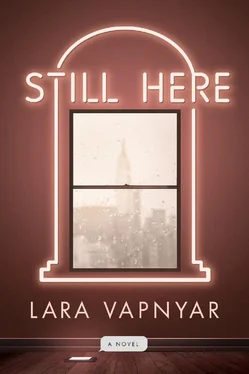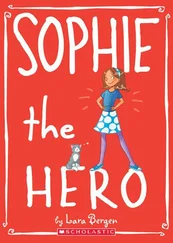Vadik looked out the window again. It seemed like they were suspended in the clouds. Vadik closed his eyes and concentrated on willing the plane to land at JFK. He imagined the hard body of the plane pushing through the sticky mass of clouds, emerging in a clean empty space between sky and ground, and then sliding down in one bold determined move until its wheels touched the runway. The cabin erupted in applause, and for a second Vadik thought that the applause was meant for him.
“Can you take me to the city?” Vadik asked Sergey as soon as they finished hugging.
“To the city? Now?” Sergey asked with a degree of puzzlement that suggested that the city was very far away. That there was some existential impossibility to getting there.
“Now. Yeah,” Vadik said.
“But Vica is waiting with all the food. She’ll be disappointed.”
The horror in Sergey’s eyes showed how much trouble Vica’s disappointment would bring to him.
So they went to Staten Island. Drove on the JFK Expressway followed by the long stretch of Belt Parkway, past the gray jellied mass of the ocean, across the foggy Verrazano Bridge, and finally down the endless Hylan Boulevard with its depressing storefronts. All that while Sergey sang along to his favorite Leonard Cohen CD.
Back at the university Sergey used to be a star. He was really handsome — everybody said that his sharp, taut features made him look like a French movie star; he was the smartest and most talented (professors used to quote him in classes); he played guitar; and he could sing, badly but still. He could have any girl he wanted. Hell, he’d snatched Vica right from under Vadik’s nose.
Anyway, Sergey was still handsome. It was his singing that made him look unbearably ugly. The scrunching of his nose whenever he had to draw out a lyric. The furrowing of his forehead whenever he had trouble pronouncing the words. The pained expression on his face during the especially emotional moments. And the singing itself. It wasn’t just that Sergey sang out of tune or that he sang with a gooey Russian accent — although that bothered Vadik too. The main problem was that Sergey’s voice, which completely drowned out Cohen’s baritone, was plaintive and childlike.
Baby, I’ve been waiting,
I’ve been waiting night and day.
Sergey sounded pathetic! Vadik couldn’t help but feel squeamish pity for him. He felt anger too, mostly because “Waiting for the Miracle” was his favorite song and Sergey’s singing was ruining it for him. Vadik saw a finger of Sergey’s leather glove sticking out from the glove compartment. He felt like yanking the glove out and stuffing it into his friend’s mouth.
He hadn’t been looking forward to being at Sergey’s place, but now he couldn’t wait to arrive. Apparently, Vica couldn’t wait for their arrival either. She rushed out of the door as soon as she heard the car and ran down the driveway barefoot, leaving footprints on the thin layer of fresh snow. Her hug was sticky and tight, and somewhat embarrassing. Vadik struggled to free himself. She looked great though, in those snug jeans and even snugger sweater, with her short curly hair cut in some new fancy way. “Vica, you look amazing,” Vadik said.
“It’s my teeth,” she said, scowling at him. “See, I finally fixed my teeth!” Vadik had no idea what she was talking about. “I used to have crooked teeth in college. Don’t you remember?”
And then he remembered. She used to smile with her mouth closed and would cover it with her hand when she laughed. When Vadik first met her, at a college party, he thought that she covered her mouth because she was shy. He found this habit intensely endearing even after he discovered that Vica wasn’t shy at all.
Vica led Vadik upstairs on a tour of the house. All that Vadik noticed was that the furniture was brown and the walls were painted yellow. “We’re giving you this exercise bike,” Vica said, pointing to a bulky apparatus in the corner of the bedroom. “It’s like new. I gave it to Sergey for his birthday, but he seems to hate it.” Vica showed Vadik where he would be sleeping. Then she took him to meet Eric. There was a four-year-old person, small, sulky, and looking like a chubby version of Sergey. He was sitting on the floor of his tiny bedroom with a Game Boy in his hands. His fingers pressed buttons with such intensity, as if his life depended on it. “Hi,” Vadik said. Eric looked at him and said “Hello.” It hadn’t occurred to Vadik to bring Eric a gift — a toy or something — and now he felt awkward. He had no idea how to talk to a child. “So, Eric,” he asked, “what do you like to do?”
“I like to kill,” Eric said and went back to pressing buttons.
The rest of the morning and the entire afternoon were spent in their roomy kitchen with a distant view of a playground and a cemetery outside. “They told us that this house had a view of the park,” Sergey explained. “It was summer, so we couldn’t see the graves behind all those leafy trees—”
Vica interrupted him. “But we can let Eric play across the street by himself, because, you know, we can see him from the window.”
Vadik pictured sad little Eric on a deserted playground, rocking in the swings facing the graves. Then he remembered to admire the house.
“Yep, this was the right choice,” Sergey said without conviction.
Vica told him that Sergey’s grandmother had died and that Sergey’s father had sold her apartment and sent the money to Sergey for the down payment. Now they were struggling to pay a huge mortgage every month, but still, it had been the right move to buy a house. Because that was how it worked here, Sergey added. Everybody we knew kept telling us that. You rented in the cheaper parts of Brooklyn for a while, then you bought a house in the suburbs or on Staten Island, then you sold that house and bought a bigger, better house, then when you grew old you left that house to your kids and moved into a retirement community. Sergey’s tone was a dark mix of hatred and resignation, which made Vadik uneasy and even frightened him a little. He tried to imagine a happier Eric, all grown up, driving his parents to the retirement community so that he could take possession of their house.
Vadik made a few attempts to steer the conversation away from real estate. In his e-mails, Sergey had always asked about their university friends, so Vadik now tried to tell him that Marik was still working on his genealogy dissertation, but that Alina had quit hers and was busy making an animated Nabokov game, and Kuzmin — remember that shithead — was involved in some business with Abramovich. Abramovich, you know, the man who owns half of Europe including the Chelsea soccer club? But then Vica stepped on his foot and shook her head. Apparently, she thought that this line of conversation would be upsetting to Sergey. “He misses our old life too much,” she had confided to Vadik during the tour of the house. She switched the subject to Vadik’s long-term plans, but that filled him with panic. He didn’t know if he wanted to go to school. He didn’t know if he wanted to get married. He didn’t know if he wanted to stay in the United States for good. He had no idea. He just wanted to lead the life of an American for a while, whatever that meant. He failed to explain his view to Vica. Even Sergey didn’t seem to get it.
They drank vodka and ate cold cuts, pickles, and salads that Sergey had bought in the only Russian grocery store on Staten Island called MyEurope. Beet salad, carrot salad, eggplant salad, mushroom salad, cheese salad, herring salad, and cabbage salad with the lovely name of Isolda. There was some bickering about that Isolda. Apparently, Vica had specifically asked Sergey to check the expiration date and he hadn’t. “Look, all the other salads expire on the nineteenth, and this one expires on the sixteenth. Which was yesterday!” Vadik volunteered to eat the Isolda, because he claimed to have an iron stomach.
Читать дальше












